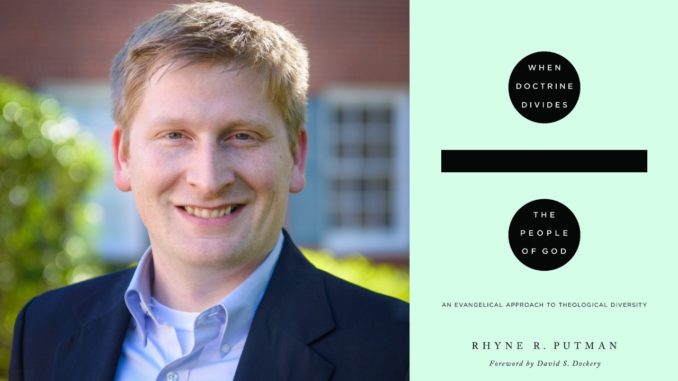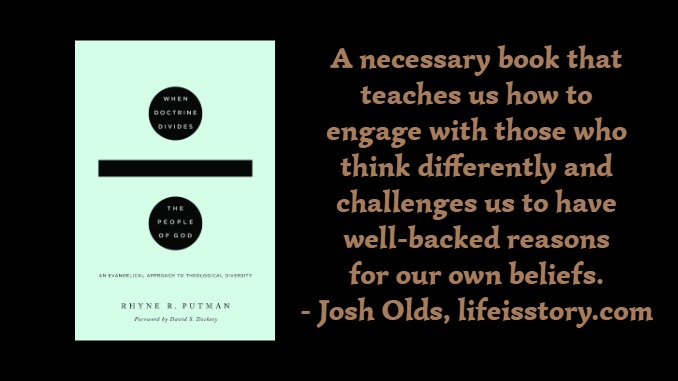
Podcast (beyond-the-page): Play in new window | Download
Subscribe: Apple Podcasts | RSS
The church I grew up in was part of what’s called the Restoration Movement. Led by Barton Stone and Alexander Campbell, the movement had the desire to unite the church and do away with denominationalism. From 1832-1906, the group was known simply as “the Christian Church.” But in 1906, the church split and today you have the Churches of Christ, Christian Church (Disciples of Christ), and various independent congregations. Stone and Campbell had started off trying to do away with divisions and instead created even more!
The church I grew up in was the result of a church split due to some specific issues within the church. Then, those who split divided into two when there were different ideas about how to organize and run the new church split. Division wins again.
Maybe that’s why I was so interested in Rhyne Putman’s When Doctrine Divides the People of God. I wanted to get to the heart of why we divide, when we should divide (and when we shouldn’t!), and how to unite even amid our differences. It was a great conversation.
The Interview | When Doctrine Divides the People of God, Rhyne Putman
This interview has been lightly edited for content and clarity. Listen to the full podcast program using the player above or visit our page at Apple Podcasts, Stitcher, or wherever your pods are cast.
Josh Olds: Now, I’ve really been looking forward to our conversation today because your book kind of hits at a very important part of theology, because in my experience as a pastor, Christians tend to define ourselves by where we disagree. That’s true in denominational divides. That can be true in specific communities between different churches in the same denomination. We seem to like we’re always looking for the areas that make us stand out and make us different, but we do that in terms of how we separate ourselves from other believers rather than defining ourselves as being united with them. So tell me a little bit about the background of this book and why you felt it was necessary topic to talk about.
Rhyne Putman: Well, Josh, it’s like you said, this is something that we as Christians have always dealt with and it’s just part of human nature. Sigmund Freud used the phrase that I’ve used in the book on a couple of occasions: “the narcissism of minor differences.” And what that basically means is we draw distinguishing lines between ourselves from other people usually based on sometimes very minor differences between the way we think and we feel and we practice our beliefs.
And, you know, we see this in the Bible as well. I think the place where it becomes the most evident is the conflicts within Judaism in the first century. Oftentimes it was the Jewish groups that had the most in common that would have the greatest disagreements. I think what really sort of pushed me into this book was the sheer frustration with the way that Christians handle their disagreements on social media platforms.
I mean, again, we’ve always had theological differences. We’ve always found ways to express our theological differences. I begin the book by talking about the Protestant Reformation and, at that time they had this new form of media, which was the movable printing press by which they expressed their disagreements. But now we all have a means by which we can sort of put our opinion out there. It’s said that the Reformation put the Bible in the hands of every believer. The age of Facebook and Twitter has put a platform in hands of every individual to express his or her opinion. And so sometimes we don’t handle our differences delicately. Sometimes we overstate our differences. But I think a lot of times what my fundamental concern is that we bring damage to our witness with the way that we handle our disagreements. So I wanted to try to help people understand “What is it that that drives us to disagree about doctrine? How can people who affirm the gospel, people who affirm the authority of Scripture, come to such disagreements? And what should we do about those disagreements?”
The Book | When Doctrine Divides the People of God
 Read the whole Life is Story review here.
Read the whole Life is Story review here.
As evangelicals, we desire to be biblical–we want our doctrine to be rooted in the Bible, our lives to be guided by the Bible, and our disagreements to be resolved by the Bible. And yet, conflicts within our church communities continue to appear and seemingly multiply with time. Interpretations of the Bible and deeply held convictions often put Christians at odds. Encouraging us toward grace in disagreement and firmness in truth, Rhyne Putman reflects on how Christians can maintain the biblical call for unity despite having genuine disagreements.
The Author | Dr. Rhyne Putman
 Rhyne R. Putman (PhD, New Orleans Baptist Theological Seminary) is an associate professor of theology and culture at New Orleans Baptist Theological Seminary, where he has served since 2010. He is the pastor of preaching and vision at First Baptist Church in Kenner, Louisiana, and has published multiple volumes and articles, such as The Method of Christian Theology and In Defense of Doctrine. Rhyne and his wife, Micah, currently reside in New Orleans together with their two children.
Rhyne R. Putman (PhD, New Orleans Baptist Theological Seminary) is an associate professor of theology and culture at New Orleans Baptist Theological Seminary, where he has served since 2010. He is the pastor of preaching and vision at First Baptist Church in Kenner, Louisiana, and has published multiple volumes and articles, such as The Method of Christian Theology and In Defense of Doctrine. Rhyne and his wife, Micah, currently reside in New Orleans together with their two children.
